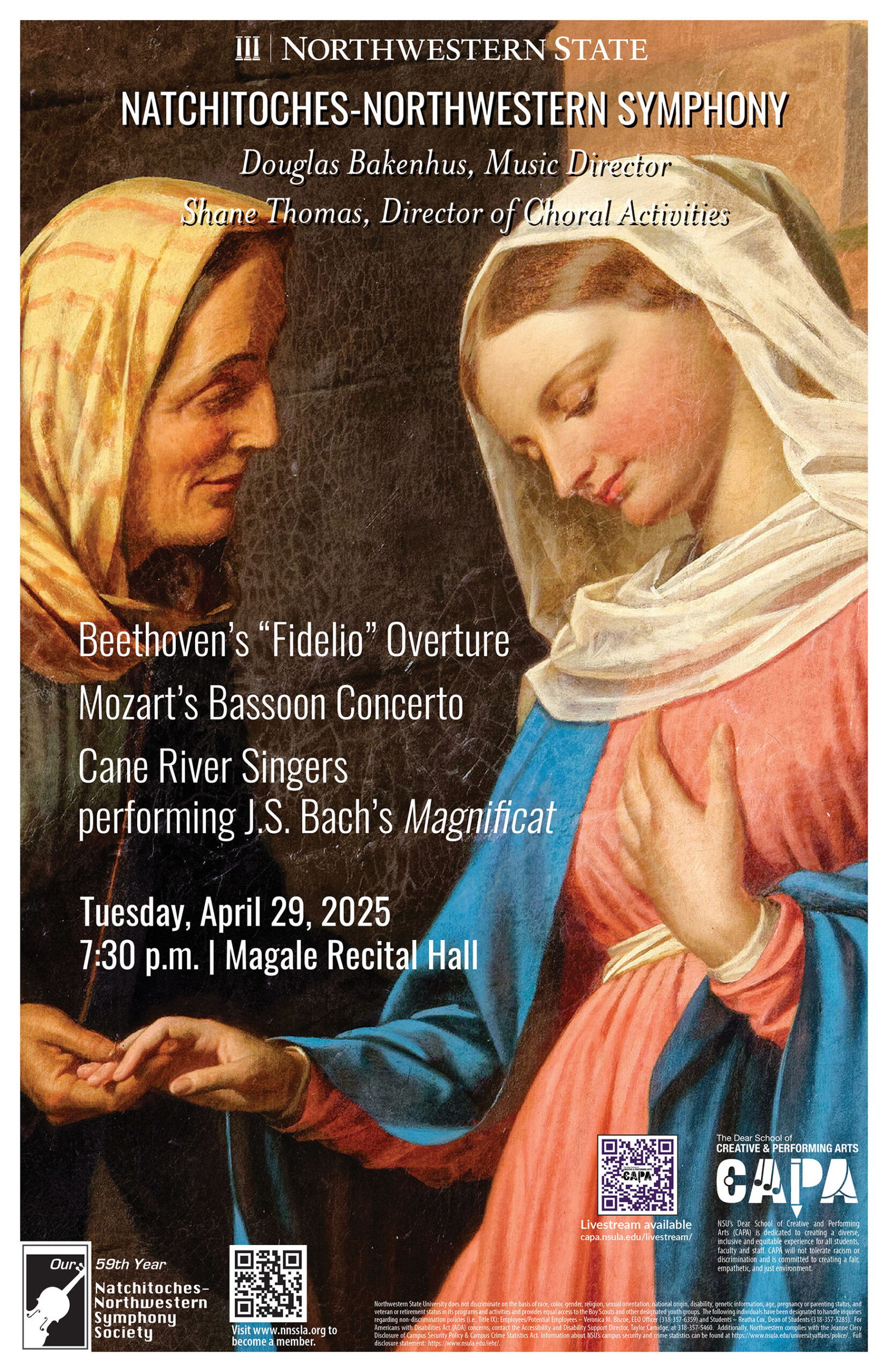NATCHITOCHES – The Natchitoches-Northwestern Symphony Orchestra will perform on Tuesday, April 29 at 7:30 p.m. in Magale Recital Hall. Tickets are $16.50 if purchased online at https://nnssla.org/ticket-sales or $15 at the door.
Dr. Douglas Bakenhus is musical director of the Natchitoches-Northwestern Symphony Orchestra. Syll-Young Olson is assistant director and Sofiko Tchetchelashvili is instructor. Dr. Shane Thomas conducts the Cane River Singers.
Cane River Singers is an unauditioned mixed chorus comprised of all choral scholarship students, faculty and community members specializing in the performance of choral masterworks. Cane River Singers has provided performances of timeless choral literature, including Duruflé’s “Requiem,” Orff’s “Carmina Burana,” Vivaldi’s “Gloria” and Beethoven’s “Ninth Symphony.”
The orchestra will play Beethoven’s “Overture to Fidelio,” Mozart’s “Concerto in Bb for Bassoon and Orchestra” and Bach’s “Magnificat.”
Beethoven’s powerful overture is a dramatic piece that sets the tone for the opera’s themes of love, freedom, and justice. It doesn’t directly quote any melodies from the opera itself, but it uses musical language to evoke these central ideas. The overture, like the opera, is often interpreted as a celebration of human resilience and the triumph of good over evil.
Bakenhus will be the soloist on the “Concerto in Bb for Bassoon and Orchestra.”
Mozart’s first documented concerto for a wind instrument, the Bassoon Concerto in B-flat, is the only surviving bassoon concerto of the five that he wrote. Many works by well-known composers simply did not survive, for various reasons. Not only does the piece showcase the technical and artistic expressive capabilities of the bassoon, but it is also the most frequently performed work for the instrument.
The soloists on “Magnificat” will be sopranos Dr. Terrie Sanders and Lhareen Lazo, mezzo sopranos Dr. Marcy McKee and Kat Wilkinson, bass Adam Philley and Thomas who is a tenor.
The Gospel of Luke, starting in chapter one, verse 39, tells the story of Mary, pregnant with Jesus, visiting her cousin Elizabeth who was also pregnant with John the Baptist. Elizabeth blesses Mary upon hearing the news of her pregnancy, and Mary’s response is known as “The Magnificat”or the Song of Mary (verses 46 – 55).
“The Magnificat” is one of the most ancient Christian hymns, and it has been set to music innumerable times. Several of those compositions may have been known by Bach, including the one composed by Kuhnau, his predecessor in Leipzig, and by Graupner, who competed with him for the post of Cantor and used his own setting of “The Magnificat” as an audition piece.
“Bach’s ‘Magnificat’ is a tour de force choral-orchestral work employing all of the quintessential compositional elements that highlights Bach’s significance today,” said Thomas. “Known for its difficult melismatic passages and five-part chorus throughout, the ‘Magnificat’ highlights vignettes within the Song of Mary text that allows all of humanity to connect with its translation – to feed the hungry, to show mercy and to exalt the lowly. Bach shapes the ‘Magnificat’ through expressive vocal solos with dramatic choral interpolations that showcase his fantastic compositional style.”
Thomas said Cane River Singers has worked tirelessly on “Magnificat” and “is honored to be joining the Natchitoches-Northwestern Symphony on what will be an incredible collaboration.”
For more information on the Natchitoches-Northwestern Symphony Orchestra go to nnssla.org.

